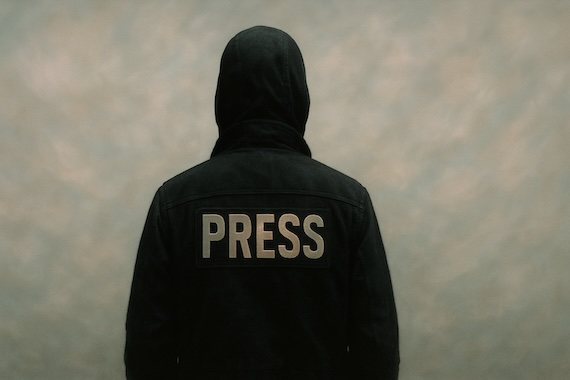A few days ago, in a full room at the opulent gardens of Schönbrunn Palace in Vienna — once home to the Habsburgs — during the 75th World Congress of the International Press Institute, Palestinian journalist Wael Al-Dahdouh addressed nearly a hundred journalists from around the world about the reality of being a reporter in Gaza over the past two years.
His deeply personal and tragic story was overwhelming even to listen to. Yet seeing him in person was, in itself, a privilege for anyone who understands the value of “putting one’s soul in one’s palm,” as he so eloquently put it.
The conversation quickly turned to the work of Palestinian journalists, the ways in which we — their international colleagues — ought to support them, and, naturally, a unanimous condemnation of Israel’s ban on international media entering Gaza.
When the discussion ended, I was left wondering whether even our questions were rightly placed — or whether we are still viewing everything through a Western lens, even those of us who do not define ourselves as such.
After two years of genocide in Gaza, it is clear that the majority of international media remain in a state of limbo — often unable to take consistent, methodological decisions on how to cover the war. The result is the publication of conflicting stories, based on conflicting sources, manipulated by conflicting interests. And the justification, within their own narrative, is always the same: “Israel does not allow international journalists into Gaza.”
Meanwhile, more than 240 of our colleagues have been killed in just 24 months — more than the total number of journalists killed in World War I, World War II, the Vietnam War, the Afghanistan War, and the Gulf Wars combined.
So, what could have been done — if anything — to help prevent the targeting of journalists and their families?
First, we should acknowledge our own responsibility in the delegitimization of Palestinian journalists. It is Western media that have legitimized Israel’s argument that Palestinian journalists are not credible reporters but rather “Hamas propagandists.” By systematically avoiding quotations or reports from Palestinian journalists on the ground — treating them not as professional reporters but merely as eyewitnesses — international outlets effectively prevalidated their devaluation by the Israeli state, which justified its actions by claiming that those targeted (often described with the chilling term “eliminated,” as in the case of Anas El-Sharif) were “not journalists.”
A Palestinian journalist seems to earn the title only after their death. Wael Al-Dahdouh’s unbearable personal story, for instance, was widely shared across Western media — but not his reporting from inside Gaza. The story of a father who learns, while working, that his wife, seven-year-old daughter, fifteen-year-old son, and one of his grandchildren were killed in an Israeli airstrike — and that his 27-year-old son was killed only a few months later — is a far more “publishable” narrative of personal tragedy than his continuous and professional coverage of a genocide in progress.
Anas El-Sharif appeared on international news only through emotional videos with his young daughter, accompanied by sentimental music — shared right after he was “eliminated” and labelled a “terrorist” by the IDF.
Mariam Abu Dakka became a symbol too; her final message to her young son turned into a “pro-Palestine” meme after she was killed while working. At least Mariam — like many photojournalists — was fortunate enough to see her byline under photos published in international outlets. Images are not as easily questioned as information.

Sharing their stories was important, yes — but it also served to soothe our own ethical discomfort. It turned journalists into the story, without ever having to promote their actual work — which would, inevitably, be challenged by Israeli embassies in every respective country.
Yes, Israel’s ban on international media entering Gaza is a major part of the problem. But the other part is that international media have demonstrated, for two years now, that until they are allowed into Gaza, they will persist in not trusting their only colleagues on the ground. Our outrage about the treatment of journalists by Israel hides a deeper truth; for years, the world’s press has refused to recognize Palestinian reporting as journalism.
At best, Palestinian journalists in Gaza have been treated as English-speaking eyewitnesses to crimes that simply happened to occur before them. And when international media are eventually allowed into Gaza, those same journalists will be hired as “fixers,” completing the cycle of delegitimization — as outsiders arrive to “show them how it’s done.”
The question that lingered in my mind as I wandered through the peaceful gardens of Schönbrunn Palace still persists:
Would the State of Israel have “eliminated” more than 240 Palestinian journalists if we — their international colleagues — had treated their work as legitimate reporting rather than “unconfirmed information”?
The views expressed in this article belong to the author and do not necessarily reflect the editorial policy of Middle East Monitor or Informed Comment.
Tony Rigopoulos is a journalist, political analyst and commentator based in Athens, Greece. He has served as editor-in-chief at Greek media outlets and has collaborated with international media, including Times Radio and the Associated Press. He is currently the political editor at Newsbomb.gr.
 Unless otherwise stated in the article above, this work by Middle East Monitor is licensed under a Creative Commons Attribution-NonCommercial-ShareAlike 4.0 International License.
Unless otherwise stated in the article above, this work by Middle East Monitor is licensed under a Creative Commons Attribution-NonCommercial-ShareAlike 4.0 International License.

 © 2026 All Rights Reserved
© 2026 All Rights Reserved